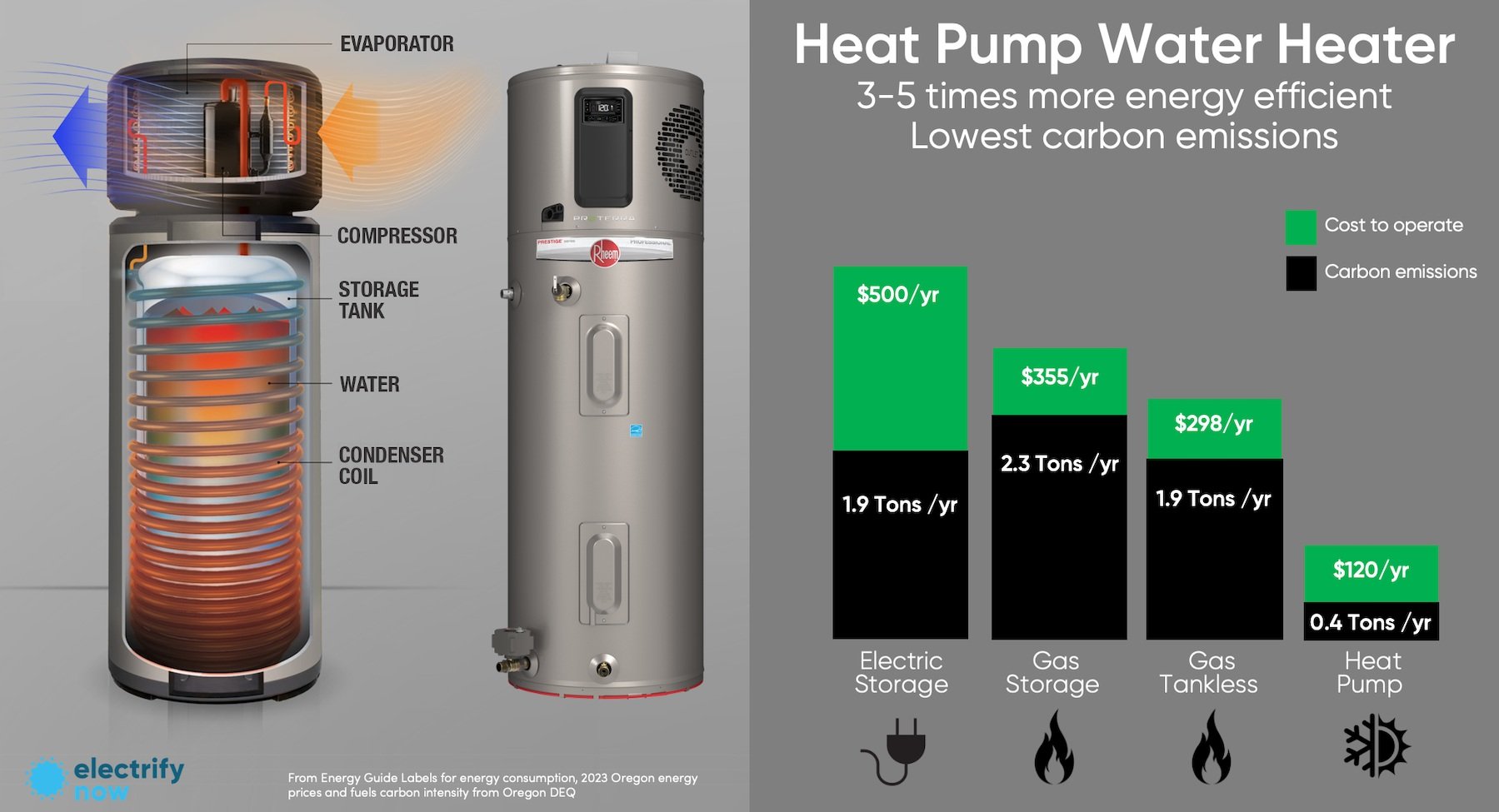Fact: Heat pumps produce fewer carbon emissions than gas
Lets do the math for those who are interested (this gets a little geeky)
The easiest way to compare the 3 technologies that we typically rely upon for heating - natural gas, electric resistance heat and electric heat pumps - is to look at water heaters which are available in all three fuel sources. The US Department of Energy provides very good information on nearly all available models through the Energy Star website and with the Energy Guide labels that are required on all water heaters. All the information below is from those sources for 50 gallon water heaters and an equivalent sized gas tankless model.
Natural Gas Storage Water Heaters. A very good natural gas water heater has an efficiency of 0.70 and consumes 249 therms of natural gas per year to meet the standardized test for hot water production. According to the Oregon DEQ, each therm of natural gas releases 18.6 pounds of CO2 when it is burned accounting for all the energy spent to extract the gas, refine it and deliver it to your home. (This is higher than the value you often see used for these calculations which only account for the CO2 from combustion. It is critical to use this lifecycle emissions value to get the true picture of the impacts from extraction to combustion.)
249 therms x 18.6 lbs CO2/therm = 4,632 lbs of CO2 per year
Natural Gas Tankless Water Heaters. These are often considered the most efficient way to heat water, but it truth they are only marginally better than gas storage models. A good tankless unit that is big enough to replace a 50 gallon storage water heater will consume 209 therms per year according to the Energy Guide label. They are less efficient than you think because they turn on nearly every time you use water unless you only turn on the cold water tap.
209 therms x 18.6 lbs CO2/therm = 3,888 lbs of CO2 per year
Electric Resistance Storage Water Heaters. The best electric resistance water heaters have an efficiency of .93 and consume 3,493 kWh of electricity per year to deliver the standardized test amount of hot water. According to the Oregon DEQ, 1.07 lbs of CO2 are emitted for every kWh of electricity produced in Oregon including energy for extraction, refinement and delivery of the fuels burned to create the electricity. (This is the lifecylce emissions value for electricity)
3,493 kWh x 1.07 lbs CO2/kWh = 3,744 lbs of CO2/year.
So in Oregon where the grid is fairly clean, a resistance water heater is slightly better than a good natural gas model. This would not be true in other parts of the country where the grid is not as clean however.
Heat Pump Water Heaters. The exciting development in this area is the electric heat pump water heater or sometimes called the hybrid electric water heater. Because of the amazing efficiency of heat pump technology, they have a rated efficiency of anywhere from 2.0 to 3.7 with models available today. That means they are as much as 4 or 5 times more efficient than a typical electric resistance water heater.
A typical hybrid electric unit has an efficiency of 3.75 and consumes 837 kWh/year.
837 kWh/year x 1.07 lbs CO2/kWh = 897 lbs of CO2/year
The Heat Pump water heater produces 1/5th of the emissions per year than the natural gas model! This technology would beat a natural gas heater anywhere in the US, even a place with dirtier electricity.
Finally - keep in mind that all these calculations are using the carbon values for the average electricity supply in Oregon. If you are using 100% renewable energy plan from your utility, or getting your energy from a Community Solar program or from your own rooftop solar, then it is legitimate to say that an electric water heater creates zero emissions. It is still much better to use a heat pump model because it consumes so much less energy and that will also save you money each year.
50 Gallon Water Heater Comparison - Oregon
Good Electric Heat Pump 897 lbs CO2/yr (Zero CO2 with renewable energy)
Good Electric Resistance 3,744 lbs CO2/yr (Zero CO2 with renewable energy)
Good Natural Gas Tankless 3,888 lbs CO2/yr (4 times more than the heat pump)
Good Natural Gas 4,632 lbs CO2/yr (5 times more than the heat pump)
Cheap or Old Natural Gas 5,079 lbs CO2/yr (almost 6 times more than the heat pump)
Resources:
Energy Star product information https://www.energystar.gov/productfinder/
Oregon DEQ Fuel Pathways - Carbon Intensity Values

